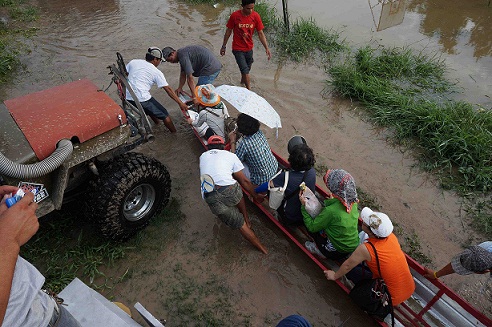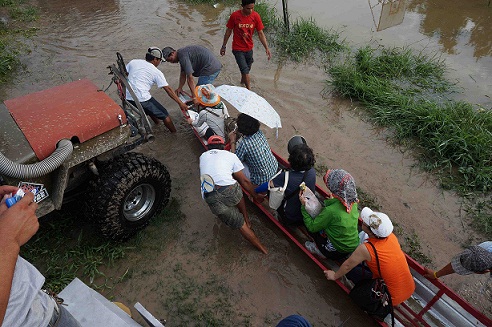Text and photos by DANIEL ABUNALES
CABIAO, Nueva Ecija – The road to Sitio Dumanas, a 30-minute drive from this municipality, is rough and narrow. As you get nearer, the road slumps, buried in knee-deep water.
This village in Barangay San Fernando Sur is home to 75 families, who for years have suffered from flooding and power outages.
The family of Noel and Imelda Catacutan has struggled to cope with rice paddies overflowing with water, leaving them with no income during the rainy season. For years, their four children played on backyards submerged in water and paddled a boat to get to school. At night, they would study in near pitch-black darkness.
“Kapag umulan at malakas ang hangin nahihirapan yung mga bata mag-aral kasi namamatay yung gasera. Minsan sa umaga na lang nila ginagawa yung assignment nila, pumapasok na lang sila ng mas maaga (When it is raining hard, the children have a hard time studying their lessons. The light in the kerosene lamp is extinguished when the wind blows. Sometimes they just do their assignments in school, so they have to get up earlier),” Imelda said.
What they did not know was that the village would soon come to “see the light.”
The much-awaited event came on a sunny afternoon in June. The Catacutans and the rest of the residents patiently waited for their visitors.
 They were told 34 Korean leaders from private and socio-civic sectors would be traveling to Sitio Dumanas to see them.
They were told 34 Korean leaders from private and socio-civic sectors would be traveling to Sitio Dumanas to see them.
The group is part of the Philippine-Korea Global Peace Leadership Exchange (GPLE), a program organized by Global Peace Foundation (GPF) Philippines and Korea. The visit is designed to foster better relations between the countries through interactions with communities here.
On that day, each family received a set of solar lamps that could light up an entire house. Solar streetlights were also installed—the seven solar-energized streetlights were from GPLE while the local government set up the steel posts.
Cabiao Municipal Mayor Gloria Congco said providing solar lamps was just the first step toward helping the community rise from poverty.
The Alllights Village project is a project of GPF. Sitio Dumanas is the 12th project site in Nueva Ecija since the GPF began its tie-up with the provincial government last year.
“Mula sa ilaw nagbigay tayo ng pag-asa dahil ang kadiliman ay magliliwanag, tutungo tayo sa edukasyon, sa pagkakaroon ng kapasidad ng mga tao upang sila’y magkahanapbuhay (By providing them with solar-energized lights, we are giving them hope. It will pave the way for the people’s education and capacitating them to have a livelihood of their own),” Congco added.
According to the Alllights Village website, the project will enable schoolchildren “to have sufficient time to study, obtain proper education, and grow to become productive citizens that contribute to the development of their villages.”
It further pointed out that the use of solar-powered lights will help reduce global warming and counter climate change by eliminating polluting fuels that are hazardous to health.
“[Some] 4,000 people die each day and a million more annually due to inhalation of poisonous gases in their homes,” the same website stated. “Smoke from biomass is therefore one of the leading cause of deaths along with HIV/AIDS and tuberculosis in underdeveloped nations.”
After providing Sitio Dumanas with solar lighting equipment, GPF Philippines, the municipal government of Cabiao, and community leaders will be addressing issues on education.
The last phase of the project will be providing livelihood opportunities in these areas. A monitoring and evaluation team will also be available for guidance and consultation.
The Koreans have so far donated a total of 699 solar lamps and 50 solar streetlights to the country. On top of this, they have aided in providing education and livelihood programs and have given cash donations.
Kim Hyekyeon, one of the GPLE Korean delegates and Chair of Yoido Leaders Club, said this was their way of giving back to the Philippines. “In history, Filipinos helped us when we were struggling as a nation after the Korean War,” Kim Hyekyeon added.
